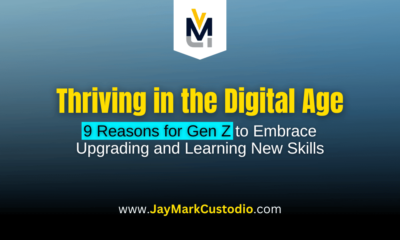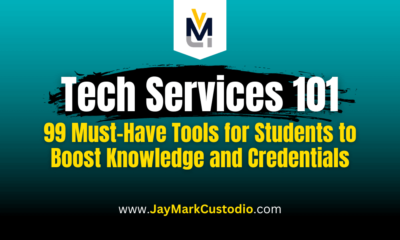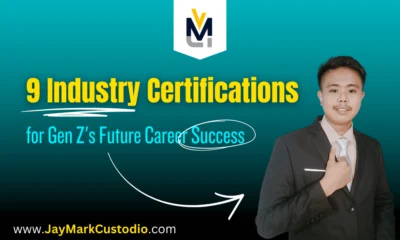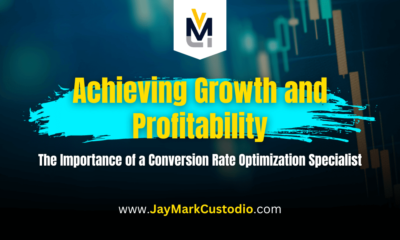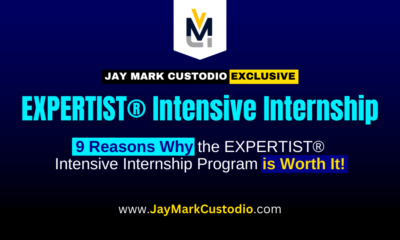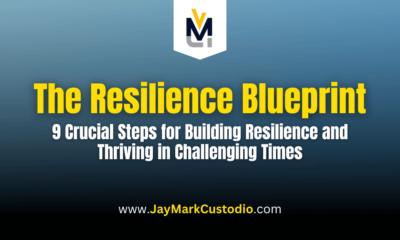In-Demand Skills
How to Future-Proof Your Career this 2024!

Hey there, my classmate!
As we prepare to finish our studies and pursue our careers, we must consider how to be competitive in a constantly changing job market.
Our generation has grown up with new technologies and job requirements constantly appearing. To stay ahead, we need to equip ourselves with skills and knowledge that will keep us relevant.
This article will explore strategies to future-proof our careers as Generation Z individuals.
Table of Contents
We will discuss topics such as building a solid personal brand, developing skills that will be in demand in the future, using technology to our advantage, networking and collaborating with others in our field, cultivating creativity and innovation, pursuing continuous learning, and adapting to change.
By taking these steps, we can prepare ourselves to succeed in the future job market, which is constantly evolving.
So, let’s dive in and learn how we can future-proof our careers as Generation Z individuals!
Understanding the Future Job Market
As we look to the future, it is clear that the job market is changing rapidly.
In today’s world, having a degree or specific skill set is no longer enough.
Instead, employers are looking for individuals with various skills and abilities that can help them stay competitive in an ever-changing landscape.
Some skills and abilities that will be in high demand in the future job market include adaptability, creativity, critical thinking, problem-solving, communication, and collaboration.
Additionally, with the rise of technology and automation, it is becoming increasingly important for individuals to have a solid digital literacy and data analysis background.
So, how can Gen Z prepare themselves for the future job market?
One of the best ways is to focus on developing these skills and abilities.
For example, coding or data analysis courses can help build a strong foundation in digital literacy, while engaging in group projects or extracurricular activities can help develop communication and collaboration skills.
It is also essential for Gen Z to stay informed about the latest trends and developments in their respective fields.
It can be done by attending conferences, reading industry publications, or participating in online forums.
In conclusion, the job market is changing, and Gen Z needs to prepare themselves for the future by developing a wide range of skills and abilities that will be in high demand.
By doing so, they can position themselves for success in an increasingly competitive landscape.
Building a Personal Brand
I’d be happy to help you understand the importance of creating a personal brand and establishing an online presence to showcase your skills, knowledge, and expertise.
Firstly, creating a personal brand is essential in today’s competitive world.
It helps you stand out and make you more recognizable to potential employers and clients.
By creating a personal brand, you can showcase your unique personality, skills, and expertise, making you more attractive to those looking for someone with your specific qualifications.
Secondly, having a solid online presence is crucial in establishing your brand.
As most people search for information online, having a professional-looking website, social media profiles, and online portfolios can help you easily showcase your work and expertise to potential clients and employers.
By doing so, you can build a network of contacts and establish yourself as an authority in your field.
Now, let me share some tips for creating a solid personal brand.
First, identify your unique value proposition – what sets you apart from others in your field.
Then, create a personal mission statement that reflects your values and goals.
It will help you stay focused and consistent in your messaging.
Next, develop a solid visual identity that reflects your brand.
It includes designing a logo, choosing a color scheme, and developing a consistent style for your website and social media profiles.
Finally, regularly engage with your audience to grow your network and establish yourself as a thought leader.
Share content that showcases your expertise participate in online communities and attend networking events to build relationships with others in your industry.
These tips help you create a solid personal brand and establish an online presence that showcases your skills, knowledge, and expertise.
Developing Skills for the Future
As we move forward into the future, a few skills are predicted to be in high demand.
Some of these include:
- Data Literacy: With the rise of technology and data-driven decision-making, it’s no surprise that data literacy is becoming increasingly important. It includes the ability to collect, analyze, and interpret data.
- Critical Thinking: As automation takes over more routine tasks, the ability to think critically and problem-solve will become more valuable. It includes skills like decision-making, creativity, and innovation.
- Emotional Intelligence: With the rise of remote work and virtual teams, emotional intelligence will become increasingly important. It includes communicating effectively, collaborating with others, and building relationships.
- Adaptability: The world is changing rapidly, and adapting to new situations and learning quickly will be crucial. It includes skills like flexibility, resilience, and a growth mindset.
As for resources to develop these skills, many online courses, certifications, and workshops are available. Some great places to start include LinkedIn Learning, Coursera, and Udemy.
Additionally, remember the power of networking and mentorship.
Connecting with professionals in your desired field can help you learn about the most valuable skills in that industry and provide opportunities for growth.
Finally, it’s essential to develop a diverse skill set.
In today’s job market, it’s rare to find a job requiring more than one skill set.
By developing a diverse skill set, you make yourself more valuable to potential employers and increase your opportunities for career advancement.
So, don’t hesitate to step outside your comfort zone and learn something new!
Embracing Technology
The role of technology in the future job market cannot be overstated.
Technology is rapidly changing how we work and the jobs available.
As Gen Z, we have grown up in a world where technology is a part of our daily lives, and we must embrace it to our advantage.
One of the significant ways technology is changing the job market is by creating new jobs that didn’t exist before.
For example, jobs like Social Media Manager, App Developer, and Data Analyst are all relatively new roles that have emerged due to technological advancements.
As more businesses go digital, there will be a higher demand for people with skills in these areas.
Another way technology is changing the job market is by making some traditional jobs obsolete.
For example, automated machines are replacing assembly line workers, and self-driving cars may replace drivers in the future.
We must develop skills that are future-proof and cannot be replaced by machines.
As Gen Z, we have grown up with technology and are comfortable using it to our advantage.
We can leverage technology to learn new skills, network with professionals, and find job opportunities.
For example, we can take online courses to improve our skills and LinkedIn to connect with professionals in our fields of interest.
In conclusion, technology is changing the job market, and we must embrace it to stay competitive.
We should develop skills that are in demand and cannot be replaced by machines.
By doing so, we can position ourselves for success in the future job market.
Networking and Collaboration
It’s great to see you taking an interest in networking and building professional relationships.
It’s an essential skill that can help you succeed in your career.
Networking is all about connecting with other professionals in your industry.
Building relationships with them can help you access new opportunities, share knowledge and resources, and stay up-to-date with industry trends and developments.
It can also help you establish a reputation and build your brand.
You must identify the right people to connect with to network and collaborate effectively.
Attend industry events, join professional organizations, and participate in online forums and social media groups to find like-minded individuals and potential mentors.
Once you’ve connected with someone, take the time to build a relationship with them. Be genuine, show interest in their work, and be generous with your knowledge and resources.
Remember that networking is a two-way street; you’ll get the most out of it if you’re willing to give and receive.
As for how networking and collaboration can help Gen Z stay ahead in the job market, it’s all about staying connected and adapting to change.
The job market constantly evolves, and the skills and knowledge you need to succeed always change.
By building a network of professionals in your industry, you’ll be better equipped to keep up with these changes and stay ahead of the curve.
Collaborating with others can help you learn new skills, gain new perspectives, and stay motivated and inspired.
In summary, networking and collaboration are essential skills for anyone looking to succeed in their career.
By building relationships with other professionals, you’ll gain access to new opportunities, resources, and knowledge and be better equipped to adapt to the ever-changing job market. Good luck!
Emphasizing Creativity and Innovation
Regarding staying ahead in today’s job market, cultivating creativity and innovation skills is key, especially for Gen Z.
Here are some ways you can develop these skills:
- Embrace diverse experiences: Exposure to diverse experiences and perspectives can help you generate new ideas and solutions. Seek out different cultural experiences, travel to new places, or take up a new hobby to expand your horizons.
- Be curious and ask questions: Curiosity can help you uncover new solutions. Asking questions and seeking out new information can challenge assumptions and promote creative thinking.
- Experiment and take risks: Don’t be afraid to try new things, take calculated risks, and learn from your failures. Experimentation can help you discover new solutions and refine your ideas.
- Collaborate with others: Collaboration can help generate new ideas and perspectives. Working with others can help you challenge your assumptions and develop new solutions.
Let’s talk about some industries where creativity and innovation are highly valued.
Some examples include:
- Technology: The tech industry is constantly evolving, and creativity and innovation are essential to keep up with the pace of change. From software development to artificial intelligence, there’s a wide range of opportunities to innovate in tech.
- Advertising and marketing: Companies must be creative in their advertising and marketing strategies to stand out in a crowded marketplace. This industry values creative problem-solving and innovative thinking.
- Healthcare: Healthcare is an industry that is constantly evolving, and new solutions are always needed to address complex problems. From developing new treatments to improving patient care, creativity and innovation are highly valued in healthcare.
Cultivating creativity and innovation skills can help you stand out in today’s job market, and many industries value these skills.
So, keep an open mind, embrace new experiences, and don’t hesitate to take risks to develop your creative and innovative potential!
Embracing Continuous Learning
As we all know, the job market is constantly evolving and changing.
To stay relevant and competitive in today’s workforce, it is essential to embrace continuous learning.
Continuous learning means constantly seeking new knowledge, skills, and training to stay up-to-date with industry trends and advancements.
This is especially important for Gen Z as they are entering a highly competitive and rapidly changing workforce.
Fortunately, many resources are available to help Gen Z continue their education and stay current with the latest industry developments.
One such resource is online learning platforms like Coursera, Udemy, and edX, which offer a wide range of courses and certifications in almost every field.
Additionally, many universities and colleges now offer online courses, making pursuing higher education and professional development more accessible than ever.
To make continuous learning a part of your career, start by setting specific learning goals and creating a plan to achieve them.
This could involve taking courses, attending conferences, or networking with industry professionals.
It’s also essential to stay curious and open to new ideas and opportunities for growth.
Remember, continuous learning is a key to success in today’s job market.
By embracing new knowledge and skills, you can stay relevant and competitive and achieve your career goals. Good luck!
Discussing the Importance of Adaptability:
Being adaptable and flexible is crucial in future-proofing your career because it allows you to stay relevant and competitive in an ever-changing job market.
Employers highly value the ability to adapt and learn new skills, which can help you stand out from other job candidates.
Additionally, adaptability can help you navigate unexpected changes or challenges in your current role.
To further emphasize the importance of adaptability, consider how industries and job requirements have changed over time.
For example, the rise of technology has transformed the job market, with many traditional jobs becoming automated or obsolete.
This has led to new industries and job roles that require different skill sets.
In addition, the ongoing COVID-19 pandemic has forced many industries to shift to remote work, highlighting the need for employees who can adapt to new work arrangements.
Another example is the healthcare industry, which has seen significant changes in recent years by introducing new technologies, such as electronic health records and telemedicine.
As a result, healthcare professionals are expected to possess technical skills and clinical expertise.
In conclusion, being adaptable and flexible is essential for future-proofing your career.
Adapting to change and learning new skills can help you stay ahead of the curve and remain competitive in a rapidly evolving job market.
Conclusion
In conclusion, understanding the future job market, building a personal brand, developing skills for the future, embracing technology, networking, and collaboration, emphasizing creativity and innovation, embracing continuous learning, and discussing the importance of adaptability are crucial factors that will help us succeed in the ever-changing world of work.
New technologies, emerging industries, and changing consumer demands will shape the future workforce.
We must be willing to adapt and evolve to stay relevant in this dynamic environment.
We need to focus on developing skills that are in high demand and build a personal brand that showcases our unique strengths and value proposition.
Networking and collaboration are also essential to success in the future job market.
We must be ready to work with others, learn from them, and leverage their skills and knowledge to achieve our goals.
Finally, embracing creativity and innovation and emphasizing continuous learning will help us stay ahead of the curve and remain competitive in the job market.
We must be willing to take risks, experiment, and learn from our mistakes to succeed in this ever-changing world.
So, let’s take these lessons to heart and prepare ourselves for the exciting opportunities.
Let’s stay curious, keep learning, and confidently embrace the future.






